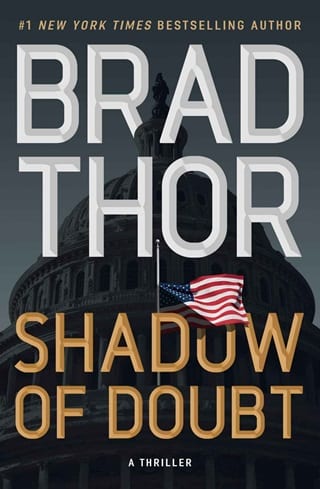Chapter 70
CHAPTER 70
B ETHESDA
It was a briefing President Porter would have preferred to have had in person, but given Maggie's condition, he agreed to do it via encrypted video link.
There had been some discussion as to whether the National Security Council should be summoned for the meeting, but in the end it was decided to limit it to the president, his chief of staff, the national security advisor, the Director of National Intelligence, and Maggie.
Her boss, Andy Conroy, had pushed her latest findings right to the top. As soon as the CIA Director read them, he pushed them further up the ladder. It was clear to everyone that POTUS was not going to want to wait to read them in tomorrow morning's PDB. He would want to be informed immediately.
Once all of the participants were on the call, President Porter said, "Maggie, it's all yours. You have the floor. Take it away."
"Thank you, Mr. President," she replied. "In your digital briefing books, you can see the photos and read the update on Balthazar, the horse belonging to President Peshkov's mistress, which was found just up the coast from Peshkov's Black Sea complex.
"More importantly, I have included secure links to portions of Norway's debriefing of ex–Russian intelligence official Leonid Grechko. Per our arrangement with the Norwegian agent conducting the debriefing, we're allowed to monitor the proceedings and to ask questions via our station chief in Oslo, Holidae Hayes.
"In Grechko's most recent session, we asked that he be pushed on the Russian nuclear weapons that had been placed in Belarus, as well as Moscow's intentions. You can listen to Grechko's responses yourself, but the gist of it is that his office was charged with developing intricate false-flag operations, as well as highly sophisticated propaganda in the run-up to a tactical nuclear weapon being detonated."
"So, they're definitely going to do it," the chief of staff stated.
"It's an option," Maggie clarified, "but it's continually looking like one they plan to exercise."
"What are the false flags and propaganda about?" the national security advisor asked.
"Moscow," Maggie replied, "wanted Grechko to have plans ready to paint NATO and its Western allies as increasingly more aggressive and belligerent actors set on destabilizing Belarus and collapsing their government."
"To what end?" the advisor asked.
"According to Grechko, the idea was to feed the narrative that the West planned to invade Belarus and force it into NATO."
"That's absurd."
Maggie nodded. "Agreed," she said. "But it gets worse. As the false-flag operations and fire hose of propaganda were rolled out, the Belarusians would understandably be nervous and on edge. It's against this backdrop that a missile launched into NATO territory could ultimately be characterized as ‘accidental.'?"
"What?" the chief of staff replied. "As in ‘Whoops, we didn't mean to press that big red button'?"
"Essentially, that's the concept," said Maggie. "However, there are several steps that would have to happen before that. Belarus would need to raise its posture, the warheads would have to be unstored from their depots and loaded onto missiles, those missiles would have to be loaded onto launchers, et cetera."
"But all of that could happen in a matter of hours," the Director of National Intelligence observed.
"That is correct."
"Those are Russian missiles, they'd be tipped with Russian nuclear warheads, and there'd conceivably be Russians somewhere in the launch chain," said the chief of staff. "How does President Peshkov think he'd escape accountability?"
"He doesn't," Maggie responded. "At least not fully. But there's a big gray area that he believes he can manipulate. Instead of taking all the heat, he'll blame-shift to Belarus, which'll be seen as having actually launched the missile. In essence, it would allow Russia to dodge a significant amount of the international condemnation while, Peshkov believes, scaring Western populations into pressuring their governments into dropping their support of Ukraine."
"Unbelievable," the chief of staff angrily stated. "The guy's going to use a cutout to do his nuclear dirty work."
"Not if I have anything to say about it," President Porter replied. "Did Grechko mention any possible targets?"
"Only one," said Maggie. "J-Town."
As she had in her meeting with the full National Security Council, Maggie once again stunned her listeners into silence.
J-Town was shorthand for NATO's key logistical hub near Jasionka Airport, outside Rzeszów, Poland, just sixty miles from the Ukrainian border.
Billions of dollars in Western military equipment and ammunition passed through J-Town on its way to Ukrainian forces. The site was critical to the war effort. If this indispensable gateway was struck, it would dramatically turn the tide in Russia's favor.
President Porter was first to break the silence. "That leaves us with just one question," he said. "How do we guarantee this attack does not happen?"
Looking into the camera on her monitor, Maggie responded, "Having listened to all of Grechko's interview, I have a couple new ideas. But they're potentially very dangerous and come with a lot of risk."
 Fullepub
Fullepub 



